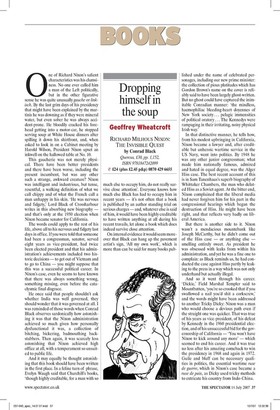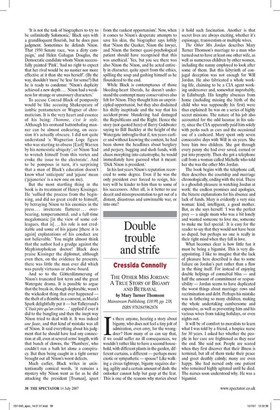Dropping himself in the soup
Geoffrey Wheatcroft RICHARD MILHOUS NIXON: THE INVISIBLE QUEST by Conrad Black Quercus, £30, pp. 1,152, ISBN 9781847242099 © £24 (plus £2.45 p&p) 0870 429 6655 Qne of Richard Nixon's salient characteristics was his clumsi ness. No one ever called him a man of the Left politically, but in the other figurative sense he was quite unusually gauche or linkisch. By the last grim days of his presidency that might have been explained by the martinis he was downing as if they were mineral water, but even sober he was always acci dent-prone. He bloodily cracked his forehead getting into a motor-car, he stopped serving soup at White House dinners after spilling it down his shirtfront, and, when asked to look in on a Cabinet meeting by Harold Wilson, President Nixon upset an inkwell on the hallowed table at No. 10.
This gaucherie was not merely physical. There have been better presidents and there have been worse, including the present incumbent, but was any other such a strange, awkward creature? Nixon was intelligent and industrious, but tense, resentful, a walking definition of what we call chippy and of what the French call a man unhappy in his skin. 'He was nervous and fidgety,' Lord Black of Crossharbour writes in this absorbing new biography — and that's only at the 1950 election when Nixon became senator for California.
The words could apply to the rest of his life, above all to his nervous and fidgety last days in office. If you were told that someone had been a congressman, senator, served eight years as vice-president, had twice been elected president and that his administration's achievements included two historic decisions — to get out of Vietnam and to go to China — you might suppose that this was a successful political career. In Nixon's case, even he seems to have known that there was always something wrong, something missing, even before the cataclysmic final disgrace.
He once said that people shouldn't ask whether India was well governed, they should wonder that it was governed at all. I was reminded of those words when Conrad Black observes sardonically how astonishing it was that the Nixon administration achieved so much given how personally dysfunctional it was, a collection of bitching, bickering, badmouthing backstabbers. Then again, it was scarcely less astonishing that Nixon achieved high office at all, with a temperament so unsuited to public life.
And it may equally be thought astonishing that this book should have been written in the first place. In a feline turn of phrase, Evelyn Waugh said that Churchill's books, 'though highly creditable, for a man with so much else to occupy him, do not really survive close attention'. Everyone knows how much else Black has had to occupy him in recent years — it's not often that a book is published by an author standing trial on serious charges — and, whatever else is said of him, it would have been highly creditable to have written anything at all during his recent travails, let alone a book which does indeed survive close attention.
On internal evidence it would seem moreover that Black can hang up the pavement artist's sign, 'All my own work', which is more than can be said for many books published under the name of celebrated personages, including our new prime minister: the collection of pious platitudes which has Gordon Brown's name on the cover is reliably said to have been largely ghost-written. But no ghost could have captured the inimitable Conradian manner: 'the mindless, haemophiliac bleeding-heart doyennes of New York society ... pelagic immensities of political oratory ... The Kennedys were rampaging in their irritating, noisy physical Irish way.'
In that distinctive manner, he tells how, from his modest upbringing in California, Nixon became a lawyer and, after creditable but unheroic wartime service in the US Navy, went into politics. By 1948 he was any other junior congressman; what made him nationally famous, admired and hated in equal degree, was the Alger Hiss case. The best recent account of this is in Sam Tanenhaus's superb biography of Whittaker Chambers, the man who delated Hiss as a Soviet agent. At the bitter end, Nixon complained that the liberal media had never forgiven him for his part in the congressional hearings which began the destruction of Hiss. He might have been right, and that reflects very badly on liberal America.
But there is another side to it. Nixon wasn't a mendacious mountebank like Joseph McCarthy, but he didn't come out of the Hiss case — or anything else — smelling entirely sweet. As president he was obsessed with leaks from within his administration, and yet he was a fine one to complain: as Black reminds us, he had conducted the case against Hiss partly by leaking to the press in a way which was not only underhand but actually illegal.
And so it went through his career. `Dickie,' Field Marshal Templer said to Mountbatten, 'you're so crooked that if you swallowed a nail you'd shit a corkscrew,' and the words might have been addressed to another Tricky Dicky: Nixon was a man who would choose a devious path even if the straight one was quicker. That was true of his years as vice-president, of his defeat by Kennedy in the 1960 presidential election, and of his unsuccessful bid for the governorship of California — 'You won't have Nixon to kick around any more' — which seemed to end his career. And it was true no less after his amazing comeback to win the presidency in 1968 and again in 1972. Guile and bluff can be necessary qualities in politics, the essential wartime ruse de guerre, which in Nixon's case became a ruse de paix, as Dicky used tricky methods to extricate his country from Indo-China.
'It is not the task of biographers to try to be unlimitedly Solomonic,' Black says with a grandiloquent flourish, but he does pass judgment. Sometimes he defends Nixon. That 1950 Senate race, 'was a dirty campaign,' and Helen Gahagan Douglas, the Democratic candidate whom Nixon successfully painted 'Pink', tad no right to expect that her rival would be no nastier nor more effective at it than she was herself'. (By the way, shouldn't 'more' be 'less' for sense?) But he is ready to condemn: `Nixon's duplicity achieved a new depth... Nixon had a weakness for strange or unsavoury characters.'
To accuse Conrad Black of pomposity would be like accusing Shakespeare of iambic pentameters or Wagner of chromaticism. It is the very heart and essence of his being: l'homme, c'est le style. Although his orotund buttonholing manner can be almost endearing, on occasion it's actually obscure. I did not quite understand 'a Wagnerian Loge figure who was starting to obsess [Earl] Warren by his nemesistic ubiquity', or Nixon 'had to wrench himself from this vortex and evoke the issue to the electorate'. And to be pompous in turn, it's surprising that a man of Black's education doesn't know what 'anticipate' and 'jejune' mean ('jejuneries' is a new one on me).
But the most startling thing in the book is its treatment of Henry Kissinger. He 'sullied the process from the beginning, and did no great credit to himself, by betraying Nixon to his enemies in the press ... inveterate flatterer ... overbearing, temperamental, and a full-time megalomanic [in the view of some colleagues, that is] ... his role is not creditable and some of his jejune [there it is again] explanations of his conduct are not believable.' You might almost think that the author had a grudge against the Mephistopholean doctor! Black does praise Kissinger the diplomat, although even then, on the evidence he presents, there was little the man ever did which was purely virtuous or above-board.
And so to the Gotterdammerung of Nixon's truncated last term and the great Watergate drama. It is possible to argue that the break-in, though deplorable, wasn't the wickedest thing that ever happened — the theft of a thimble in a convent, as Muriel Spark delightfully put it — but Talleyrand's 'C'etait pire qu'un crime. . .' applied if ever it did to the bungling and then the inept way Nixon tried to deal with it. It was indeed une faute, and that kind of mistake was all of Nixon. It said everything about his judgment that he should have had any connection at all, even at several arms' length, with that bunch of clowns, the 'Plumbers', who couldn't run a bath let alone a conspiracy. But then being caught in a tight corner brought out all Nixon's worst defects.
Much earlier, Black writes in unintentionally comical words, 'it remains a mystery why Nixon went as far as he did attacking the president [Truman], apart from the rankest opportunism'. Now, when it comes to Nixon's desperate attempts to save his skin, the biographer says loftily that 'Nixon the Quaker, Nixon the lawyer, and Nixon the former quasi-psychological patient should have recognised that this was unethical.' Yes, but you see there was also Nixon the Nixon, and he acted entirely in character, quite apart from the ethics, spilling the soup and gashing himself as he floundered to the end.
While Black is contemptuous of those bleeding-heart liberals, he doesn't understand the contempt many conservatives also felt for Nixon. They thought him an unprincipled opportunist, but they also disdained his shifty ineptitude and the way that his accident-prone blundering had damaged the Republicans and the Right. Hence the story (not quoted here) of Barry Goldwater saying to Bill Buckley at the height of the Watergate imbroglio that if, ten years earlier and without knowing the context, he had been shown the headlines about burglary and perjury, bugging and slush funds, with chaos morphing into catastrophe, he would immediately have guessed what it meant: 'Dick Nixon is president.'
In his last years Nixon's reputation recovered to some degree. Even if he was the only president ever forced to resign, history will be kinder to him than to some of his successors. After all, is it better to use deceit and misrepresentation to get out of a distant, disastrous and unwinnable war, or into one?


















































 Previous page
Previous page